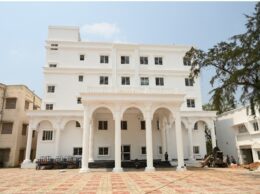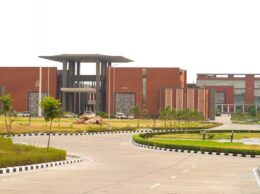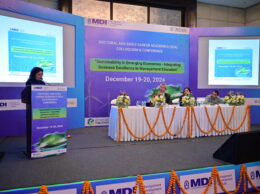CHENNAI / DELHI : Indian Institute of Technology Madras’ (IIT Madras) Centre of Excellence for Road Safety (CoERS) organized a workshop in Delhi today (11th Nov 2022) to strength trauma care in the country. The topic of the workshop was ‘Strengthening Trauma Care: An Essential Component of Road Safety.’
Funded by the Union Ministry of Road Transport and Highways (MoRTH) along with the Union Ministry of Health and Family Welfare (MoHFW), healthcare officials of different States and Union Territories attended the workshop.
Annually, the number of road crash fatalities has been increasing with over 1.5 lakh lives lost from road crashes during 2019, as per a MoRTH report. Further, the number of people who sustained grievous injuries was 1.36 lakh people. These injuries lead to a sustained reduction in quality of life with additional medical expenses and even loss of income due to injuries or disabilities leading to a major socio-economic burden.
As nearly 50 per cent of mortality occurred within first 10 minutes of an injury, a good trauma care programme is required to improve road safety to allow efficient and streamlined patient care delivery from evacuation to rehabilitation.
Addressing the event, Chief Guest Shri. S. Gopalakrishnan, IAS, Special Secretary, Union Ministry of Health and Family Welfare (MoHFW), said, “This is a very significant event that can shape our responses to accidents and trauma. There are accidents happening and an unnaturally high number of people are dying. We need bring that down. Our response has been in silos. The focus of highways is on engineering, from health side, it has been on trauma care and so on and so forth. There is a need to go for a data-driven approach to solve this problem.”
Further, Shri. S. Gopalakrishnan said, “iRAD (developed by IIT Madras) is a working solution which can solve the problem but it becomes more effective when all the stakeholders are involved. The idea is when things happen, data from different stakeholders, from police to emergency care to insurance down the line, should be uploaded on to this platform. This should be the ‘single point of truth’ for all stakeholders. It is electronic and paperless and this workshop will help sensitise all the States’ health officials. From the next calendar year, iRAD should be stabilized and we should be getting responses from all stakeholders.”
Further, Shri. S. Gopalakrishnan said, “I would like to commend IIT Madras and the CoERS for having come out with a technical solution like iRAD that has been proven to work. It is now upto the stakeholders to make use of it.”
A panel discussion on ‘Challenges in the trauma-emergency ecosystem at the hospital level in India and the way forward’ was also organized during the Workshop.
Speaking during the workshop, Mr. Gaurav Gupta, Director (Road Safety), Union Ministry of Road Transport and Highways (MoRTH), said, “India is one of the fastest-growing large economy, which necessitates a widening road network. India ranks first globally in terms of the number of fatalities from road accidents. The Government of India is committed to reducing road accident-related fatalities and serious accidents. Countries such as the U.S., though having more accidents, have very less fatalities. The objective of emergency care is to avoid preventable deaths and disabilities, limit the severity of injury and ensure the crash survivors recovery and re-integration into the society.”
Mr. Gaurav Gupta added, “Road safety is a very complex issue and involves many streams. It requires multiple stakeholders from Central and State Governments to private sector and NGOs to reduce fatalities.”
The key outcomes targeted from this workshop include:
Ø Align states and union territories to perform a baseline survey of trauma care systems for capacity and capability mapping. A framework to perform a baseline survey of trauma centre was demonstrated during the workshop.
Ø An institutional registry for daily performance monitoring of trauma care centres will be demonstrated and an application for it will be shared.
Ø Sharing of the Tamil Nadu Experience in Trauma Care along with its best practices and challenges in establishing Tamil Nadu Accident and Emergency care Initiative (TAEI).
Ø Discussion on Challenges in the trauma-emergency ecosystem at the hospital level in India and the way forward
Ø Encouraged the use of iRAD/ e-DAR as a standardised reporting platform for road traffic trauma.
Setting the context for Data-driven trauma care, Prof Venkatesh Balasubramanian, Head, CoERS, and Professor, RBG Labs, Department of Engineering Design, IIT Madras, who is coordinating this initiative, said, “Trauma is a subset of the larger set of emergency care. We are trying to align stakeholders, get the ‘Lean Processes’ in healthcare delivery and have a data-driven healthcare. It all starts with the ‘4Es’ model of Education, Emergency care, Engineering and Enforcement besides Empathy. In Tamil Nadu, we built a nodal care system called ‘Tamil Nadu Accident and Emergency Care Initiative’ (TAEI), which has achieved results.”
Prof. Venkatesh Balasubramanian added, “The Union Ministry of Road Transport and Highways (MoRTH) has been major funder for our initiatives. The CoERS works on various aspects from capacity improvement to data analytics besides driver performance analysis… iRAD is being effectively used by all States to share the data on road accidents. The quality of data will allow for interventions to be planned. This will give clarity on areas for investing limited resources.”
IIT MADRAS WORK ON TRAUMA CARE
IIT Madras has developed a data-driven method to improve trauma care. The principal issue with policy has been the lack of quality data.
The Centre of Excellence for Road Safety (CoERS), led by Prof. Venkatesh Balasubramanian, developed the ‘Indian Road Accident Database’ (iRAD), which allowed law enforcement, highway authorities and the health departments at a state level to systematically log an accident and then log all follow-up action as well. This enables efficient and streamlined patient care delivery from evacuation to rehabilitation.
The model is currently in operation in Tamil Nadu as the Tamil Nadu Accident and Emergency Care Initiative (TAEI) and is under study for implementation in other States.
Under TAEI, the condition of the patients brought to the trauma ward is assessed by a trauma care team at the triage room before according them colour codes based on the severity of the patient. Patients are given basic care to stabilise them in case they need advanced surgery after which they are then shifted to a centre where advanced levels of care can be provided.









